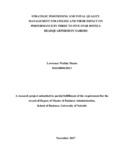| dc.description.abstract | Strategic Management is an approach through which the objectives of an organization are specified, followed by policies and plans on how to achieve them, and allocating of necessary resources to implement those policies and plans. On the other hand, strategic positioning is a marketing concept that outlines what a firm ought to do in order to effectively market its products or services to its target market while Total Quality Management refers to an approach to long term success of an organization primarily through customer satisfaction. In TQM, all the members of an organization are involved in value addition to resources, products, services, and the organizational culture. Hotels need to adopt the strategic management drivers that enable them to tailor their services to customer needs. This is due to the fact that the hotel sector requires a high level of service which demands hotels to differentiate their offering to retain and build loyalty from customers. This study therefore sought to determine the extent to which strategic positioning and TQM as strategies have impacted the performance of Kenyan three to five star hotels. Four theories anchored this research; the Resource Based view, Environment Dependence Theory, Competitive Advantage Theory and Contingency Theory. The research design adopted for this study was the cross sectional survey. The study population comprised of 98 star rated hotels in Kenya ranging from 3 to 5 star hotels. Simple stratified sampling method was used to extract sample elements from each cluster of hotels. The study worked with a sample size of 40 hotels. Questionnaires were used to collect primary data. Both descriptive and inferential analyses methods were used in analysis of the data. The research found out that the independent variables which include differentiation strategy, costing and promotion, service quality and pricing strategy strongly and positively relate to performance of the three to five star hotels in Nairobi; the associations were established to be significant. The strongest association was between performance and service quality while the least was between performance and costing and promotion. However, the independent variables explain up to only 14.1% of the changes in performance of the hotels. The study established that adopting positioning and Total Quality Management strategies assists the organizations in enhancing performance through confronting or avoiding competition, facilitating the fine tuning of strategy through enhancing customer relationships and providing framework on which to build and coordinate the elements of the marketing mix. The study also concluded that differentiation strategies, costing and promotion strategies, effective pricing strategies and provision of quality services significantly impact the performance of the hotels. The study recommends that the industry should continuously undertake leadership strategies, intentionally develop and implement various positioning and TQM strategies and also set aside sufficient budgetary allocation towards developing and implementing the strategies. | en_US |



